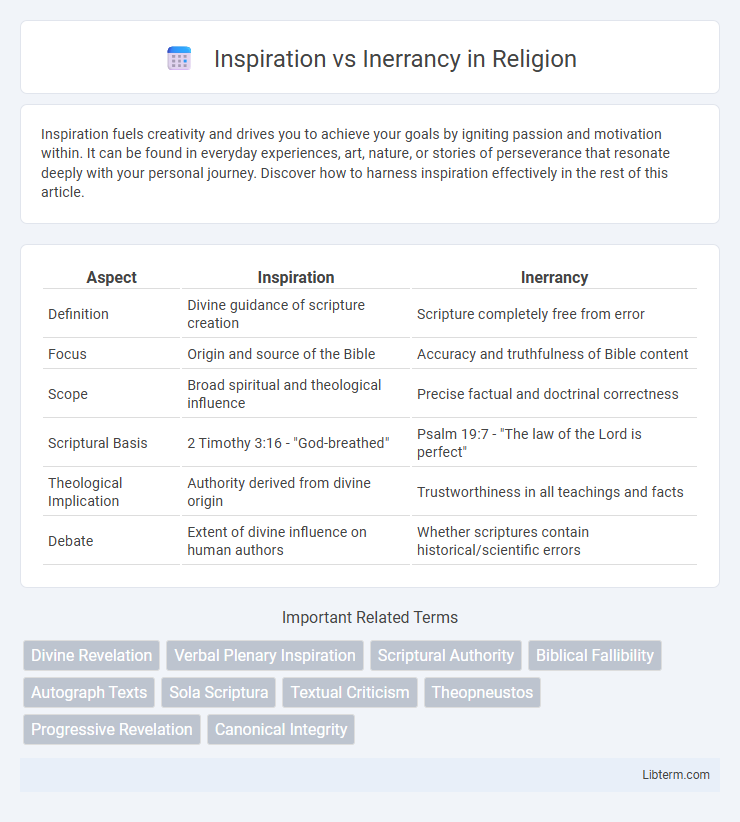Inspiration fuels creativity and drives you to achieve your goals by igniting passion and motivation within. It can be found in everyday experiences, art, nature, or stories of perseverance that resonate deeply with your personal journey. Discover how to harness inspiration effectively in the rest of this article.
Table of Comparison
| Aspect | Inspiration | Inerrancy |
|---|---|---|
| Definition | Divine guidance of scripture creation | Scripture completely free from error |
| Focus | Origin and source of the Bible | Accuracy and truthfulness of Bible content |
| Scope | Broad spiritual and theological influence | Precise factual and doctrinal correctness |
| Scriptural Basis | 2 Timothy 3:16 - "God-breathed" | Psalm 19:7 - "The law of the Lord is perfect" |
| Theological Implication | Authority derived from divine origin | Trustworthiness in all teachings and facts |
| Debate | Extent of divine influence on human authors | Whether scriptures contain historical/scientific errors |
Defining Inspiration and Inerrancy
Inspiration refers to the belief that the authors of scripture were guided by a divine influence, ensuring their writings convey God's intended message. Inerrancy asserts that the Bible, in its original manuscripts, is without error or fault in all its teachings, including historical and scientific details. Together, these concepts define the foundation for understanding the divine authority and reliability of sacred texts within theological studies.
Historical Development of Both Doctrines
The doctrines of Inspiration and Inerrancy have evolved through extensive theological debates beginning in the early church, with Inspiration emphasizing the divine origin of Scripture and Inerrancy asserting the Bible's complete factual accuracy. Historical development shows Augustine and later Reformers like Calvin upheld Inspiration while nuanced views on scriptural infallibility emerged, culminating in 19th and 20th-century fundamentalist affirmations of strict Inerrancy. Contemporary scholarship continues to explore these doctrines, balancing historical context, theological implications, and interpretive frameworks within Christian traditions.
Biblical Basis for Inspiration
The Biblical basis for inspiration emphasizes that Scripture is God-breathed, as stated in 2 Timothy 3:16, affirming the divine origin of the Bible. Inerrancy underscores the belief that God's inspired Word is without error in its original manuscripts, grounded in verses like Psalm 119:160 and John 17:17. Understanding inspiration involves recognizing that Scripture communicates God's truth through human authors under the Holy Spirit's guidance, making the Bible authoritative and trustworthy.
Scriptural Arguments for Inerrancy
Scriptural arguments for inerrancy emphasize passages such as 2 Timothy 3:16, which asserts that all Scripture is God-breathed and useful for teaching, reproof, correction, and training in righteousness, underscoring divine inspiration and ultimate truth. Psalm 19:7 highlights the perfection of the law of the Lord, reinforcing the belief that Scripture is free from error. Jesus' affirmation in John 10:35 that Scripture cannot be broken further supports the doctrine that the Bible is entirely trustworthy and without error in its original manuscripts.
Key Differences Between Inspiration and Inerrancy
Inspiration refers to the belief that the authors of the Bible were guided by the Holy Spirit, influencing their writing and ensuring the message aligns with divine will, while inerrancy asserts that the Bible is completely free from error in all its teachings, including historical and scientific facts. Inspiration emphasizes the spiritual origin and purpose of Scripture, whereas inerrancy focuses on the absolute accuracy and truthfulness of every detail within the biblical text. Understanding this distinction is crucial for theological interpretation and doctrinal development within Christian traditions.
Notable Theological Perspectives
Notable theological perspectives on Inspiration vs Inerrancy emphasize the belief that divine inspiration of Scripture ensures its spiritual authority, while interpretations of inerrancy vary from strict literal accuracy to a recognition of contextual and genre-specific nuances. Evangelical theologians like B.B. Warfield assert inerrancy as essential to Scripture's trustworthiness, whereas scholars such as Karl Barth highlight the dynamic and relational aspects of inspiration without insisting on verbal inerrancy. Contemporary debates often center on how to reconcile the historical and cultural realities of biblical texts with the doctrine of divine inspiration.
Inspiration: Implications for Faith
Inspiration in theological context signifies the divine influence guiding biblical authors, shaping scripture as a trustworthy foundation for faith and moral guidance. This concept emphasizes the active role of the Holy Spirit in ensuring the Bible's messages resonate with spiritual truth and divine purpose. Belief in inspiration fosters confidence in scripture's authority, encouraging believers to engage with the Bible as a living text that informs and transforms their faith journey.
Inerrancy and Modern Biblical Criticism
Inerrancy asserts that the Bible, in its original manuscripts, is without error in all its teachings, encompassing theology, history, and science. Modern Biblical Criticism, including higher criticism and source criticism, challenges this by analyzing texts through historical context, authorship, and literary forms, often questioning traditional authorship and historical accuracy. The tension between inerrancy and modern criticism influences contemporary theological debates and impacts hermeneutical approaches within evangelical scholarship.
Debates and Controversies in Contemporary Christianity
Debates over inspiration versus inerrancy center on whether the Bible is divinely inspired but contains human elements or is completely free from error in all aspects. Contemporary Christianity faces controversies as some theologians argue for a nuanced view of inspiration that allows for historical and scientific inaccuracies, while others uphold strict biblical inerrancy as essential for doctrinal authority. These disputes impact interpretations of scripture, church teachings, and the boundaries of faith adherence in modern Christian communities.
Practical Impact on Christian Life and Doctrine
Understanding the distinction between inspiration and inerrancy significantly influences Christian life and doctrine by shaping how believers interpret Scripture and apply its teachings. Viewing inspiration as God's guidance in the Bible's composition allows for recognizing human elements within the text, fostering a more flexible approach to biblical authority in ethical decision-making and theological development. Inerrancy, asserting that Scripture is free from error in all aspects, demands stringent adherence to biblical commands, reinforcing doctrines as absolute truths that directly inform moral conduct and ecclesiastical teachings.
Inspiration Infographic

 libterm.com
libterm.com